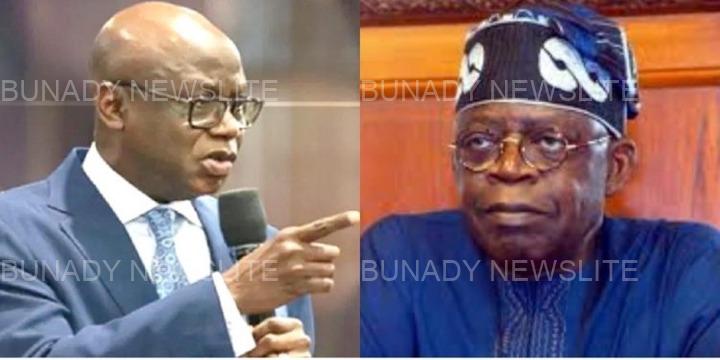Tinubu Presidency Responds To Pastor Bakare’s Easter Sermon Slamming Administration Over Economic Hardship, Abuse Of Power
Bakare, speaking during a State of the Nation address at The Citadel Global Community Church in Oregun, Lagos, condemned what he described as the erosion of democratic institutions and the transformation of Nigeria into a mafia state.
The President Bola Tinubu-led administration has acknowledged Pastor Tunde Bakare’s Easter Sunday sermon, in which he criticised the government for worsening economic hardship, descent into tyranny, and abuse of power.
Bakare, speaking during a State of the Nation address at The Citadel Global Community Church in Oregun, Lagos, condemned what he described as the erosion of democratic institutions and the transformation of Nigeria into a mafia state.
He accused those in power of lacking humility and character, and urged Tinubu to seek wise counsel and govern with empathy.
Reacting on behalf of the Presidency, Daniel Bwala, Special Adviser to the President on Policy Communication, described Pastor Bakare‘s sermon and speech as “quite objective”.
“He gave his general opinion on events and decisions of government; He critiqued certain polities and applauded some; he further offered his suggestions on the way forward,” he said.
“Importantly, he acknowledged the successes and strides of the President and his administration.
“Although we differ with him in some areas and positions, but we respect his right to say his mind, and assure him as with many Nigerians that President Tinubu is determined to deliver on the promise to the Nigerian people.
“Happy Easter and best wishes to the good people of Nigeria.”
In his address, Bakaree noted the stark contrast between the present legislature and past assemblies, which had once stood up against executive overreach.
Bakare further lambasted recent developments in the Senate, specifically the mistreatment of Senator Natasha Akpoti-Uduaghan, who faced attempts to silence her as she demanded greater accountability from the Senate President, Godswill Akpabio. Bakare accused some senators of dragging the institution through disgraceful behaviour and failing to uphold the dignity of their office.
Bakare also took aim at the broader political culture in Nigeria, which he described as a form of “motor park politics” perpetuated by veteran politicians and amplified under Tinubu’s influence. He argued that under this style of politics, Nigeria’s institutions had become tools of power consolidation rather than vehicles for effective governance.
The pastor’s critique extended to President Tinubu himself, whom he accused of fostering a political environment where the National Assembly had become subservient to the executive. Bakare warned that the country’s political system was at risk of transforming into a dictatorship, with the executive branch wielding unchecked power.
He urged the president to reconsider his approach, stating that no leader should be entrusted with unlimited power.
He said, “It is clear that our so-called leaders are determined to turn Nigeria into a mafia state. The two main contenders in the ongoing institutional immorality are the executive and the legislature.
“It’s often said that these two arms of government suffered the worst forms of arrest and development because they were the direct victims of the era. But after 26 years of uninterrupted democracy, one must ask how much longer before our institutions finally mature. While it is not in dispute that our institutions and constitution are inadequate, it has become obvious that our biggest problems in this nation are the occupiers of these institutions and executors of the constitution.
“The quality of leadership in Nigeria has become so repugnant that citizens must declare a state of emergency on governance, demanding that every aspiring public office holder undergo rigorous psychiatric evaluation before seeking election.”
Bakare also delved into the country’s economic challenges, particularly the president’s handling of critical reforms such as the removal of fuel subsidies and the devaluation of the naira.
He expressed concern over the hardship these policies had inflicted on Nigerians, with soaring inflation, food insecurity, and a deepening economic crisis. The pastor highlighted the alarming spike in food prices, the fall in foreign direct investment, and the suffering of millions of Nigerians who found themselves trapped in a cost-of-living crisis.
While acknowledging that difficult reforms often come with hardship, Bakare urged the government to show empathy and transparency in its approach. He suggested that the administration had failed to sufficiently cushion the effects of its reforms, and he called for greater accountability from those in power.
Bakare also pointed out the broader issue of leadership deficiency in Nigeria. He proposed that public office aspirants should undergo rigorous psychological evaluations to ensure that they possess the requisite competence and character. He noted that the failure of Nigerian leaders to embody wisdom, decorum, and decency had undermined the integrity of the nation’s institutions.
Despite his criticisms, Bakare did acknowledge some positive developments under the current administration, such as the increase in Nigeria’s foreign reserves from $35 billion in May 2023 to $40 billion by November 2024. However, he emphasised that these achievements should not overshadow the broader governance challenges facing the country.


